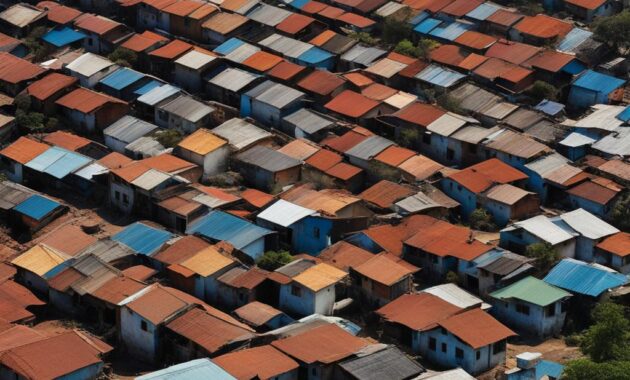Welcome to our article on global economic inequality. As a society, we are facing a growing divide between the rich and poor, with vast differences in income and wealth distribution. This divide affects not only individual lives but also societies as a whole, creating significant economic and social challenges worldwide.
However, we believe that bridging the divide and addressing economic inequality is within our reach. By working together, we can find solutions that promote economic justice and create opportunities for all individuals and communities.
Join us as we explore the complexities of global economic inequality, uncover the root causes of this issue, and identify strategies for making a positive change. Together, we can bridge the divide and create a more equitable world for all.
Understanding Global Economic Inequality
Global economic inequality refers to the unequal distribution of income and wealth between countries and within societies. Understanding its causes and consequences is crucial to finding solutions that address the root problems and create meaningful change.
One of the main contributing factors to global economic inequality is income disparity. In many countries, the top 1% of earners make a disproportionate amount of the total income, while the bottom 50% struggle to make ends meet. This creates a significant wealth gap that limits opportunities for those on the lower end of the spectrum.
| Country | Top 1% income share | Bottom 50% income share |
|---|---|---|
| United States | 20% | 12% |
| China | 14% | 15% |
| India | 15% | 27% |
Table: Income distribution in selected countries (data from the World Inequality Database).
Another significant factor is wealth distribution. Wealth is often accumulated over generations and can compound over time, leading to vast disparities between individuals and families. This not only perpetuates economic inequality but also creates additional obstacles, such as limited access to education and healthcare.
It is important to note that global economic inequality is not solely a result of individual actions or choices. Systemic barriers, such as discrimination and lack of social policies, also play a significant role in perpetuating economic disparities.
“Wealth is often accumulated over generations and can compound over time, leading to vast disparities between individuals and families.”
Overall, understanding the multiple factors that contribute to global economic inequality is crucial to developing effective strategies for reducing it. By acknowledging these challenges and working towards equitable solutions, we can create a more just and sustainable world for everyone.

Strategies for Reducing Economic Inequality
Reducing economic inequality is a complex issue that requires a multifaceted approach. By implementing a combination of social policies, wealth redistribution, and education initiatives, we can work towards a more equitable world for all.
Social Policies
Social policies play a crucial role in reducing economic inequality by addressing the root causes of poverty and promoting equal opportunities. Government policies such as progressive taxation, minimum wage laws, and healthcare reform can help to create a more level playing field for all individuals, regardless of their economic background.
| Social Policy | Description |
|---|---|
| Universal Basic Income | A policy that provides a guaranteed income to all citizens, regardless of their employment status, to ensure a basic standard of living. |
| Progressive Taxation | A tax system that levies higher taxes on those with higher incomes, aiming to reduce income inequality. |
| Minimum Wage Laws | Laws that mandate a minimum wage for all workers, to prevent exploitation and ensure a fair standard of living. |
Wealth Redistribution
Wealth redistribution is another key strategy for reducing economic inequality. By redistributing wealth and resources from the wealthiest to the most vulnerable, we can help to create a more balanced economy and provide greater opportunities for those who have been historically marginalized.
“A nation’s greatness is measured by how it treats its weakest members.” – Mahatma Gandhi
Some examples of wealth redistribution policies include progressive taxation, estate taxes, and inheritance taxes. These policies aim to reduce the concentration of wealth among a small percentage of the population and redistribute it to those in need through social welfare programs, education initiatives, and other forms of support.
Education
Education is perhaps the most powerful tool we have in reducing economic inequality. By providing access to quality education for all individuals, we can help to level the playing field and create opportunities that were previously unavailable.
From early childhood education to vocational training and university programs, education has the power to transform lives and empower individuals to reach their full potential. By investing in education initiatives and promoting equal access to education, we can ensure that every individual has the chance to succeed regardless of their economic background.
Conclusion: Working Together to Find Solutions for Global Economic Inequality
We have explored the issue of global economic inequality and the impact it has on societies worldwide. By understanding the factors that perpetuate unequal opportunities and wealth distribution, we can take steps towards bridging the divide and creating a more equitable world.
Through implementing effective social policies, wealth redistribution, and ensuring access to quality education, we can work towards narrowing the economic gap. However, it is important to recognize that addressing global economic inequality requires collective efforts and a sense of global responsibility.
As we move forward, let us commit to finding solutions for global economic inequality. Let us work together, across borders and communities, to create a more equitable and sustainable future for all.




